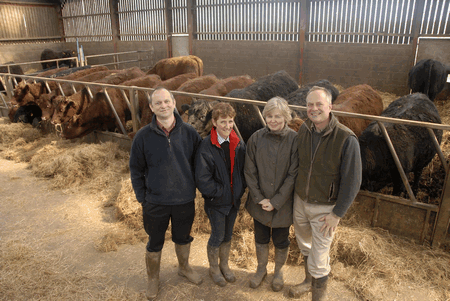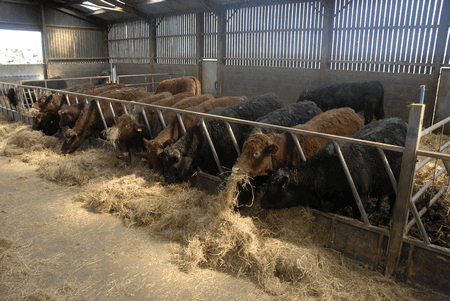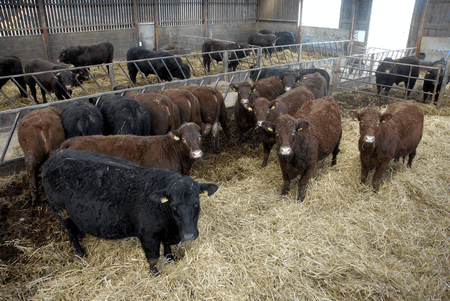Salers genetics prove tempting for suckler producers

Suckled calf producers who adopt a “hit and miss” approach to buying-in herd replacements are facing a serious shortfall in the supply of beef-cross heifers and a hike in prices for those that do come onto the market.
Retaining home-bred heifers is the smart way to tackle suckler replacements, but it has taken 20 years for producers to wake up to the value of the maternal traits of the Salers.
And while potential bull buyers are keeping the phone red-hot in the farmhouse of the Rigel herd in North Yorkshire, it’s not just farmers running suckler cows in the UK who are now recognising what this herd has achieved in two decades of intense breeding and selection.
Two Salers bulls – including a black polled bull – have just been bought from the Rigel herd at Middleton-on-Leven, near Yarm by a leading French breeder in the Auvergne. They are the first Salers bulls to be sent from the UK to the breed’s homeland.
Rigel Pedigree – the herd’s trading name – was set up almost 20 years ago by Terence and Jane Pye and Malcolm and Gill Pye. As the herd has steadily increased to its current 150 cows, the partners have remained totally focused on strengthening the breed’s renowned traits of easy calving, milkiness, fertility and longevity while still maintaining the high growth rates of male calves – at least 1.5kg a day.

Terence Pye reckons more suckled calf producers are recognising the value of breeding their own herd replacement females. “We’ve undertaken a strict policy of breeding and recording. Our aim has always been to produce the type of Salers cattle we can confidently offer to commercial suckler herds to produce herd replacements with almost 20 years of recording.
“But at the same time Salers bulls will produce male calves with weight-gains that can match the progeny of other continental terminal sire breeds.” Bulls are equally matched by level groups of in-calf heifers showing scale, shape and style, as welll as a quiet temperament.
Easy calving is the norm in the Rigel herd. It’s a trait that’s been prioritised and put to the test for many years via the Pye’s Salers-cross cattle that are run with heavily muscled Charolais sires.
“Genetics have been developed to produce cattle with the essential maternal traits, but we’ve also focussed on robustness to ensure we’re breeding cattle with sound legs and feet, hardiness, foraging ability and resistance to disease.

The Rigel herd has had a host of top winners in the show ring over the years – among them is the bull Sagitaire who was imported from the breed’s bull testing station in France 2002. Seven-year-old Sagitaire currently weighs 1075kg – and has only eaten forage for the last six years.
His performance figures show that from the 232 cows he’s served over five years he produced 236 calves with only six assisted calvings – including three calvings of heifers and two sets of twins. The average gestation date over five years was 281 days.
While the Pye’s believe the Salers’ proven traits are priorities for suckled calf producers, they acknowledge polled cattle are an important bonus. “To develop our polled line we didn’t want to simply retain cattle for that trait when they may have been rejected for other reasons,” adds Mr Pye.

Their research revealed superior, pure French-bred polled genetics in Canada. The Pyes imported semen and have spent 10 years combining polled genetics with genetics from their team of imported, performance tested French sires in the Rigel herd.
Black-coated Salers have also emerged from the Rigel programme, with the latest star being a son of the herd’s leading sire and top show winner Rigel Othello Poll. Othello, who is now 11 years old and still running with 30 cows, sired the black-polled bull Rigel Thomas Poll which is one of the bulls recently exported to France. He’s been joined by the red polled bull Rigel Richard Poll who is sired by Noth American import KK Petro’s Polled Red Sun.
“The UK suckler sector is moving into a new era. We believe the Salers’ ability to introduce the maternal traits that are fundamental to profitable suckled calf production have never been more important as herd replacement costs become a major issue,” says Mr Pye.
With good traits for easy calving, growth, temperament on the female side and miscling and growth on the male, the Salers presents an ideal package for suckler producers.
